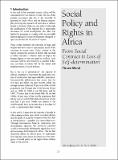| dc.contributor.author | Manji, Firoze | en |
| dc.date.accessioned | 2016-02-01T14:34:34Z | |
| dc.date.available | 2016-02-01T14:34:34Z | |
| dc.date.issued | 01/10/2000 | en |
| dc.identifier.citation | Manji, F. (2000) Social Policy and Rights in Africa . IDS Bulletin 31(4): 11-20 | en |
| dc.identifier.issn | 1759-5436 | en |
| dc.identifier.uri | https://opendocs.ids.ac.uk/opendocs/handle/20.500.12413/8789 | |
| dc.description.abstract | Summaries The agenda for social development in Africa, and therefore the framework in which social policy is defined, has undergone major shifts over the last forty years. This has partly been the result of the ability of post?colonial governments to depoliticise poverty and demobilise the movements that brought them to power. But the major reason has been the current phase of the globalisation of capital, which has demanded a major restructuring of the world economy to suit its needs. The primary instruments used in effecting those changes were structural adjustment programmes and associated policies. These have resulted in the few accumulating (on a global as well as national level) immense wealth while the majority were condemned to greater poverty, and a reversal of the social gains of independence. In effect, there has been an increasing disenfranchisement of the majority in determining the goals of social development. With the rise of globalisation, the agenda for social development is being set, largely unilaterally, by undemocratic institutions of globalisation in the interests of multinational corporations. | en |
| dc.format.extent | 10 | en |
| dc.publisher | Institute of Development Studies | en |
| dc.relation.ispartofseries | IDS Bulletin Vol. 31 Nos. 4 | en |
| dc.rights.uri | http://www.ids.ac.uk/files/dmfile/IDSOpenDocsStandardTermsOfUse.pdf | en |
| dc.title | Social Policy and Rights in Africa | en |
| dc.type | Article | en |
| dc.rights.holder | © 2000 Institue of Development Studies | en |
| dc.identifier.doi | 10.1111/j.1759-5436.2000.mp31004002.x | en |

